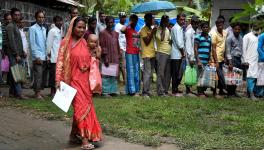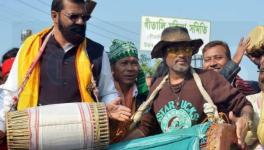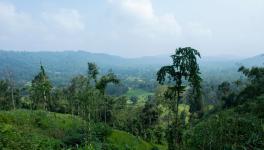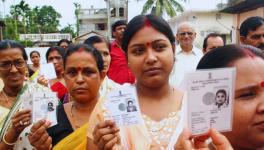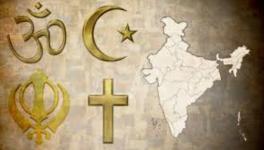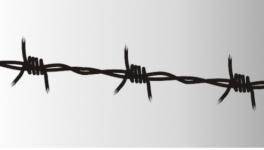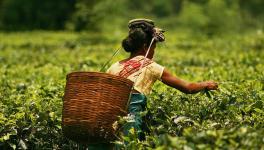The Citizenship Bill and the Resurgence of the Rising Sun
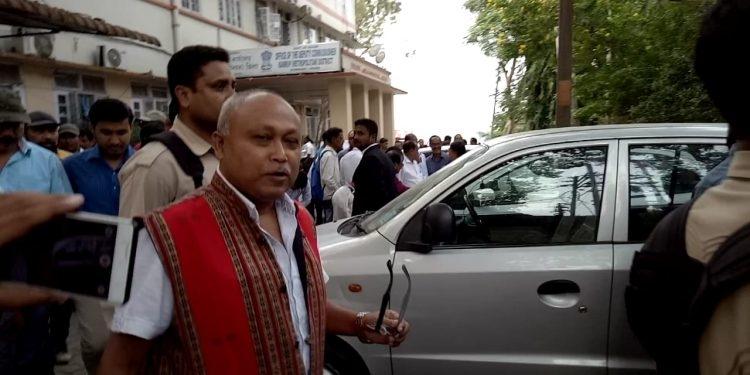
ULFA leader Mrinal Hazarika at the CJM Court premises after being granted bail | Image Credit: Northeast Now
A conglomeration of around 70 groups agitating against the Citizenship (Amendment) Bill, 2016 descended upon Guwahati yesterday. The groups under the banner of Sankalpa Shikha Jatra, and led by the Krishak Mukti Sangram Samiti (KMSS) attempted to gherao Dispur, the administrative capital of Assam. The KMSS led by Akhil Gogoi accused the Sarbananda Sonowal-led Bharatiya Janata Party (BJP) government of selling out Assam.
On the same day, the All Assam Student’s Union (AASU) held torch lit rallies against the Bill in Doom Dooma, Dhemaji, Khetri, Silapathar and Udalguri. The unit leaders of AASU criticised the state government for their apparent stand on the Bill at each rally. They also shouted slogans against the Bill and the BJP government.
Also Read | Is Assam being Polarised on the Citizenship Bill Issue?
What is the Citizenship Bill?
The Citizenship (Amendment) Bill, 2016 is a proposed legislation to enable a fast track India citizenship process for all non-Muslims (and atheists) from Afghanistan, Pakistan and Bangladesh who come to India whether lawfully or not. Through this proposed amendment, Buddhists, Christians, Hindus, Jains and Sikhs would be declared refugees, and would receive concessions on their duration of residence in India before applying for citizenship.
What is the controversy?
The problem with this Bill is that it falls foul of Article 14 of the Constitution of India, which bars discriminatory legislation. The reason being that there are other categories of persons who legitimately should be considered refugees. The other reason is that the Bill quite clearly limits the exemptions to ‘Muslim majority’ countries. Though applicable to the entire country, the biggest opposition to the Bill has come from the Northeast and Assam in particular.
Ahead of Parliament’s Monsoon Session this year, the entire Northeast witnessed demonstrations against it. There was only one place in the entire region where the Joint Parliamentary Committee received positive noises on the Bill and it was in the Barak Valley. Everywhere else, they found hostility. The reason for the region’s hostility towards the Bill is the fear in the minds of many that the Bill would result in increased migration from Bangladesh that could outnumber the local communities. Further, in an electoral democracy, numbers determine the leaders. Thus, the fear is to be rendered powerless in one’s own homeland.
Also Read | The Conflicting Views on Minority Status in Assam
The Citizenship (Amendment) Bill, 2016 had almost become a non-issue when the Union Government did not press its passage in the Monsoon Session of Parliament. However, with the Winter Session arriving, there are murmurs that the Bill will be taken up again. What makes this more believable is when the final draft of the National Register of Citizens (NRC) and local journalists found that the districts traditionally suspected of housing undocumented migrants – due to a large Muslim population – turned out to have some of the lowest rates of exclusion. Conversely, there are fears among the Hindu Bengali speakers in Assam that the NRC would disenfranchise them. There are several reasons for this situation.
One reason may be that due to Muslim Bengali speakers mostly being suspected of being undocumented migrants, the community has learned the importance of maintaining all identity documents. Whereas the Hindu Bengali speakers may have tended not to be so systematic. Another reason may be that a significant Hindu Bengali speakers may in fact be undocumented migrants.
Also Read | The Citizenship Amendment Bill, Assam Accord and the People of Assam
Between the BJP and ULFA
Statements made by BJP state legislator, Shiladitya Deb, have also not gone unnoticed. Deb had attempted to launch an agitation in favour of the Bill in Guwahati. However, statements from pro-talks United Liberation Front of Assam (ULFA) leaders such as Jiten Dutta and Mrinal Hazarika allegedly threatened a return to 1983. The two ULFA leaders were booked and arrested, but have now been released on bail, as there was little evidence against them.
However, following Dutta and Hazarika’s statements, five Bengali speakers were shot dead in Tinsukia. The police are adamant that the anti-talks faction of ULFA was behind the killings. However, the Paresh Baruah-led faction released a press statement on its official letterhead denying any role. The killings sparked an outrage among the Bengali-speaking community of Assam, who subsequently launched a shutdown. However, by this time, the old cleavage on the basis of language had already been created. Assamese speakers did not comply with the shutdown.
Another outcome of the divided opinion against the Citizenship Bill is that according to reports, more young people are being drawn towards Paresh Baruah’s ULFA. On October 24 this year, a video appeared on Facebook of 25-year-old Pankaj Pratim Dutta. Dressed in fatigues, and holding a Kalashnikov, Dutta stated that his reason for joining was that the State had failed Assam, and in his opinion, sovereignty was the only way forward. On November 13, another report stated that 16-year-old Karishma Mech from Tinsukia had also joined ULFA. Dutta was the vice president of AASU’s Dergaon unit, whereas Mech was pursuing her class X in Tinsukia.
Also Read | The BJP Will Find Itself in a Bind Over the NRC
Following ULFA’s split between 2011 and 2013, the Paresh Baruah-led ULFA (Independent) suffered a setback, as a sizeable number of cadres stuck with those who had entered talks. Thus, the most immediate concern for the group was to increase the cadre strength. However, at the time, the group was facing a legitimacy crisis. The dominant perception of ULFA and Paresh Baruah were that they were nothing more than a gang of thugs. Thus, their recruitment efforts proved exceedingly unsuccessful. All of this appears to have changed with the Citizenship Bill.
It is clear that in order to avoid ULFA’s resurgence, the BJP will have to ditch the Bill. On the other hand, it is also clear that they would probably lose an electorate in the process. However, the Hindustan Times has reported unnamed government sources mulling a system of ‘work permits’ for those left out of the NRC. Those possessing work permits would not be able to vote, thus, defeating the purpose of cultivating a constituency. Therefore, the likely game plan of the BJP is to bulldoze the Citizenship Bill for the Bengali-speaking Hindus and issue work permits to the Bengali-speaking Muslims so as to avoid a Rohingya-like situation. But, as mentioned earlier, such a plan will only push young people into the camps in Myanmar.
Get the latest reports & analysis with people's perspective on Protests, movements & deep analytical videos, discussions of the current affairs in your Telegram app. Subscribe to NewsClick's Telegram channel & get Real-Time updates on stories, as they get published on our website.









